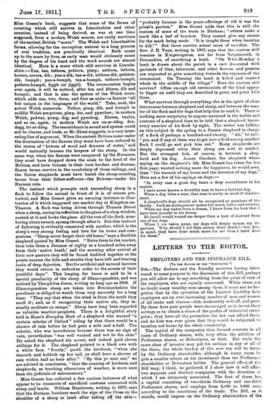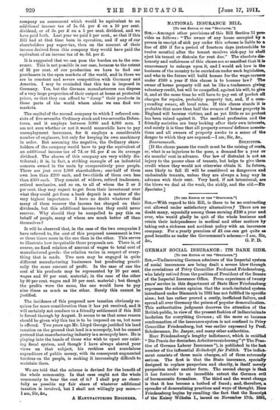LETTERS TO TILE EDITOR.
EMPLOYERS AND THE INSURANCE BILL.
(TO THZ EDITOR OF TES "SracTATos.-1 Srs,—The doctors and the friendly societies having inter. vened to some purpose in the discussion of this Bill, perhaps you will allow me to say something from the point of view of the. employers, who are equally concerned. While there are no doubt many wealthy men among them, it must not be for- gotten that by the operation of the Limited Liability Acts employers are an ever-increasing number of men and women of all ranks and classes—rich, moderately well-off, and poor. By these Acts poor people were encouraged so to invest their savings as to obtain a share of the profits of industrial enter- prise ; they have all the protection the law can afford theta, and no hint was ever given that they would be subjected to taxation not borne by the whole community.
The capital of the companies thus formed consists in all cases of Ordinary shares, with, very often, the addition of Preference shares, or Debentures, or both. But while the same class of investor may put his savings in any or all of the three, the whole burden of this new tax will be borne by the Ordinary shareholder, although in many cases be gets a smaller return on his investment than the Preference shareholder or Debenture bolder. The general effect of the Bill -may; I think, be gathered if I show how it will affect two separate and distinct companies with the direction of which I am intimately associated. The first of these has. a capital consisting of two-thirds Ordinary and one-third Preference shares, and employs from 6,000 to 8.000 men,. according to the conditions of the trade. The Bill, as .it. stands, would impose on the Ordinary shareholders of the
company an assessment which would be equivalent to an
additional income tax of ls. 6d. per on a 10 per cent. dividend, or of 3s. per on a 5 per cent. dividend, and we have paid both. Last year we paid 5 per cent., so that if this Bill had at that time been in operation, and if any of our shareholders pay super-tax, then on the amount of their income derived from this company they would have paid the equivalent of an income tax of 4s. 8d. per B.
It is suggested that we can pass the burden on to the con- sumer. This is not possible in our ease, because to the extent of 95 per cent. of our production we have to find our purchasers in the open markets of the world, and in these we are in constant and severe competition with Germany and America. I may be reminded that this tax is imposed in Germany. Yes, but the German manufacturers can dispose of a very large proportion of their output at home at protected prices, so that they can afford to " dump" their products in those parts of the world where alone we can find our markets.
The capital of the second company to which I referred con- sists of five-sevenths Ordinary stock and two-sevenths Deben- tures, and it employs between 3,000 and 4,000 men. I am not sure whether or not it would meanwhile have to pay unemployment insurance, for it employs a considerable number of engineers, but only for keeping its own machinery in order. But assuming the negative, the Ordinary share- holders of the company would have to pay the equivalent of an additional income tax of id. or Sd. per £ on its average dividend. The shares of this company are very widely dis- tributed ; it is, in fact, a striking example of an industrial concern owned in the main by comparatively poor people. There are just over 1,000 shareholders ; one-half of them own less than £200 each, and two-thirds of them own less than £303 each. They consist of widows, retired tradesmen, retired mechanics, and so on, to all of whom the 2 or 3 per cent. they may expect to get from their investment over what they could get from a bank deposit is a matter of the very highest importance. I have no doubt whatever that many of them recover the income tax charged on their dividends, but this additional income-tax they could never recover. Why should they be compelled to pay this on behalf of people, many of whom are much better off than themselves ?
It will be observed that, in the case of the two companies I have referred to, the cost of this proposed assessment is two or three times more in the one than in the other. This serves to illustrate how inequitable these proposals are. There is, of course, no fixed relation of amount of wages to total cost of manufactured goods : the relation varies in respect of every- thing that is made. Two men may be engaged in quite different manufacturing businesses but producing practi- cally the same amount of profit. In the case of one the cost of his products may be represented by 10 per cent. wages and 90 per cent. material; in the case of the other by 90 per cent. wages and 10 per cent. material ; but though the profits were the same, the one would have to pay nine times as much as the other. Surely this cannot be justified.
The incidence of this proposed new taxation obviously re- quires far more consideration than it has yet received, and it will certainly not conduce to a friendly settlement if this Bill is forced through by August. It seems to us that some reason should be given why this tax is to be imposed on us, but none is offered. Two years ago Mr. Lloyd George justified his land taxation on the ground that land is a monopoly, but he cannot pretend that manufacturing industry is a monopoly here. He is playing into the hands of those who wish to upset our exist- ing fiscal system, and though I have always shared your views on that subject, his reckless and scandalous expenditure of public money, with its consequent augmented burdens on the people, is making it increasingly difficult to maintain them.
We are told that the scheme is devised for the benefit of the whole community. In that case ought not the whole community to bear the cost of it ? I shall pay as cheer- fully as possible my fair share of 'whatever additional taxation is involved, but I shall not willingly pay more.— I am, Sir, &o.,
A MANUFACTURING ENGINEER.











































 Previous page
Previous page